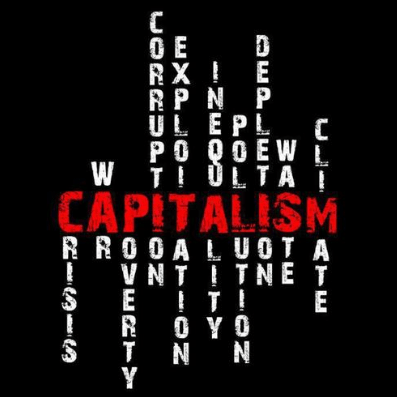
‘Saving Capitalism for the many, not the few’ is the book written by Robert Reich, former Secretary of Labor under Bill Clinton Administration that got worldwide attention for his projecting the lop sided working of US capitalism that worked for the few and ignored many. His work is the revelatory indictment of our economic policy, for example, “in 1978, the chief executives of America’s big companies took home 30 times the pay of their average workers; in 2013, that multiplier was 296” writes Reich.
Author, a known non-Marxist Leftist in US refers to role of the right-wingers like ‘United decision’, corporate lobbying for tax rates on capital gains and the accrual of “dynastic wealth” that put together gave US monopoly capitalism its present, shape, might and ills. From his own experience Reich learnt that free market economy swelled coffers of monopoly corporate houses at the cost of fiscal ruin of countless middle class homes. He indicts big business for this malaise and warns to save American capitalism from its most predatory, selfish instinct. Coming from horse’s mouth, this narrative indeed is candid and thought-provoking!
That’s not new
As is known, under market economy, democratically elected governments, have little or no role to play in shaping fiscal policies as some one else writes the rules of the market. Over the last three decades, the lead authors in USA have been Wall Street, big corporations and the wealthy elite who often sacrificed peoples’ economic interest at the altars of big business. Reich doubts that “we are lurching toward a capitalism so top-heavy it cannot be sustained” and suggested urgent reforms to keep it going. Reich and some other like him, inadvertently or otherwise have moved closer to Marxian axiom of ultimate collapse of capitalism, that they don’t support from their hearts.
Because Robert Reich isn’t a revolutionary stuff and fails to appreciate that capitalism basically works for corporate profits and not for people’s need and the system has inbuilt crises that one day, according to Karl Marx would make it fall. He stands against monopolies that are upshot of unbridled competition in free market. He doesn’t approve of income inequalities but fails to raise his finger against capitalism that prospers because of that. Reich likes capitalism but dislikes some of its outcomes and unlike Marx doesn’t believe in its demise.
He however, hoped that by injecting certain reforms “capitalism would make conditions better both for the elite as well for the middle class. Being an ardent fan of capitalism, author wishes it to stay put with necessary make up. As a true admirer, author wanted to maintain the sparkle on wrinkled face of his aging darling by applying some sort of facial pack of Reform etc.
Changing Moods
Paul Krugman a well-known economic expert while writing review of Reich’s Book says, “It was gratifying to find the stark candor behind the title of Reich’s book. ‘Saving Capitalism’ assuredly implies that capitalism is on the rope-in danger of expiring-an implication that I both believe and welcome”. It may be noted that Robert Reich along Paul Krugman and Joseph Stiglitz constitute the non-Marxist Left intellectual trio in US.
Many wonder, why it did take these intellectuals so long to arrive at this juncture, a place that Lenin had visited over hundred years ago? Also when similar conclusion about monopoly capitalism working was drawn by others some fifty years ago in their literary works.
It is however hard to deny that Capitalism since days of great depression in first half of last century through this century’s Global Economic Meltdown managed to keep it going. It made some cosmetic changes here and there without touching the cause of malaise that time and again raised all the dust.
More than a century ago Marx, Engels and Lenin stated that inbuilt crises of capitalism would lead to its collapse. But bourgeoisie thinkers belittled their observations. Later in 2008 they however, knocked Marx’s door to seek the key to unlock mystery of collapse of giant industrial and financial institutions including Lehman Brothers Bank whose liquidation triggered the worst ever global recession in 70 years. Let us now go into to some of the contemporary media reports about bourgeois celebrities looking towards Marx to get to the root cause of global financial meltdown.
They Looked to Marx
“The Pope has been quoted as having praised Marx’s Das Capital for its great analytical quality. Archbishop of Canterbury Rowan Williams recalled Marx’s analysis of Capitalism saying, “Marx long ago observed the way in which unbridled capitalism became kind of mythology, ascribing reality, power and agency to things that had no life themselves.”
Those spiritual souls besides, Marx’s students included some of the resolute rightist politicians, economists, entrepreneurs and journalists. One such important person was the French President Nicholas Sarkozi who had been spotted flicking through Das Capital. German Finance Minister Peer Steinbruck also said nice things about it. Some British cheerleaders for free market, and international media barons like The Times and the Daily Telegraph, have suddenly become interested in Marx. There has been a wave of soul- searching analysis of whether he was right after all.
With capitalism in crisis, Karl Marx has become fashionable again in the West. Das Capital, his seminal work, is set to become the bestseller in Europe, writes Hindu India -22/10/2008.
In the end
Reich’s anxiety over top-heavy Capitalism that wrote destinies of majority of Americans confirms “there isn’t a “free market” there’s a market governed by manmade rules and laws that were written to advantage some and not others. Government therefore, he says, must step in and rewrite the economy’s rules in several key areas by adopting the following measures:
(1) Federal antitrust enforcement (curbing monopoly) would help smaller business compete and usher in new entrepreneurial energy. (2) Reversing the decline of labor unions would increase the bargaining power of employees in many industries, who typically have seen their wages stagnate as executive suite pay has skyrocketed. And the (3) benefits given by government to incorporating businesses should be tied to workplace practices like sharing the gains from the growth with workers while also taking the interests of their communities and the environment into account.
But Reich maintains that anything like that won’t come easily or without a massive fight. “The moneyed interests have too much at stake in the prevailing distribution of income, wealth and political power to passively allow countervailing power to emerge”. “While they would be wise to support it for all the reasons I have enumerated above—they will nonetheless resist.” He says.
That way he talks about Marxian theory of s ‘Socialism to be achieved through class struggle’ in his own polite and polished words.


 South Asian News E-Paper
South Asian News E-Paper Punjabi News E-Paper
Punjabi News E-Paper

















